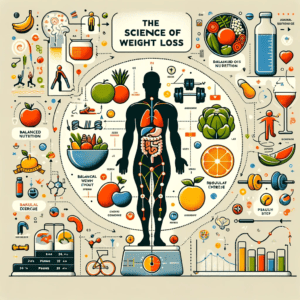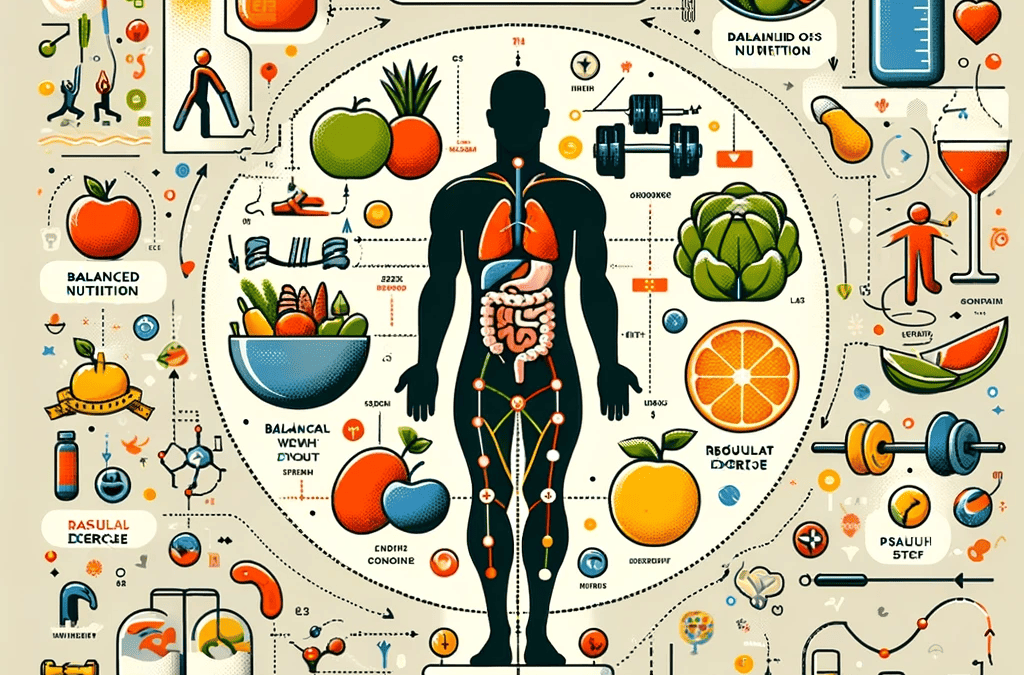
The Science Of Weight Loss
The Science Of Weight Loss. Understanding the science of weight loss is crucial for long-term success. Many people embark on weight loss journeys without fully understanding the underlying principles and concepts that drive effective and sustainable weight loss.
By gaining a deeper understanding of the science behind weight loss, individuals can make informed decisions about their diet, exercise, and lifestyle choices, leading to better outcomes and improved overall health.
Understanding the Science of Weight Loss: Key Concepts and Principles
To understand weight loss, it is important to grasp the basic principles that govern it. One of the fundamental concepts is energy balance, which refers to the relationship between the calories consumed through food and the calories expended through physical activity and bodily functions. To lose weight, one must create a calorie deficit by consuming fewer calories than they burn. This can be achieved through a combination of diet and exercise.
Metabolism also plays a crucial role in weight loss. Metabolism refers to the chemical processes that occur within the body to convert food into energy. The rate at which an individual’s body burns calories is influenced by factors such as age, gender, body composition, and activity level. Understanding metabolism can help individuals make informed choices about their diet and exercise routines to optimize weight loss.
The Role of Diet in Weight Loss: Evidence-Based Strategies for Success
A healthy diet is essential for successful weight loss. It is important to focus on nutrient-dense foods that provide essential vitamins, minerals, and fiber while being low in calories. A balanced diet should include a variety of fruits, vegetables, whole grains, lean proteins, and healthy fats.
Meal planning can be a helpful strategy for weight loss. By planning meals in advance, individuals can ensure they have nutritious options readily available and avoid impulsive food choices. Portion control is also crucial for weight loss. It is important to be mindful of portion sizes and avoid overeating.
The Importance of Physical Activity: Tips and Tricks for Staying Active
Physical activity is a key component of weight loss. Regular exercise not only burns calories but also helps build lean muscle mass, which can increase metabolism and aid in weight loss. Incorporating physical activity into daily life can be achieved through various strategies.
Finding activities that one enjoys is essential for long-term adherence to an exercise routine. Whether it’s walking, swimming, dancing, or playing a sport, engaging in activities that bring joy can make exercise more sustainable. It is also important to set realistic goals and gradually increase the intensity and duration of workouts to avoid burnout or injury.
The Science of Metabolism: How to Boost Your Metabolic Rate
Metabolism plays a significant role in weight loss. While some individuals may have a naturally faster metabolism, there are strategies to boost metabolic rate for weight loss. One effective way is through strength training exercises. Building lean muscle mass can increase metabolism as muscle burns more calories at rest compared to fat.
Eating enough protein is also important for boosting metabolism. Protein has a higher thermic effect, meaning it requires more energy to digest compared to carbohydrates or fats. Including protein-rich foods such as lean meats, fish, eggs, and legumes in the diet can help increase metabolic rate.
The Role of Sleep: How to Optimize Your Sleep for Better Results

Sleeping For Weight Loss
Sleep plays a crucial role in weight loss. Lack of sleep can disrupt hormones that regulate appetite, leading to increased cravings and overeating. It can also negatively impact metabolism and energy levels, making it harder to engage in physical activity.
To optimize sleep for better weight loss results, it is important to establish a consistent sleep schedule and create a relaxing bedtime routine. Avoiding caffeine and electronic devices before bed can also promote better sleep quality. Creating a comfortable sleep environment, such as keeping the room cool and dark, can further enhance sleep quality.
The Psychology of Weight Loss: Strategies for Overcoming Emotional Eating and Cravings
The psychological aspect of weight loss is often overlooked but plays a significant role in success. Emotional eating and cravings can derail weight loss efforts. Understanding the triggers for emotional eating and finding alternative coping mechanisms, such as engaging in hobbies or seeking support from friends and family, can help manage emotional eating.
Practicing mindful eating is another effective strategy for weight loss. This involves paying attention to hunger and fullness cues, eating slowly, and savoring each bite. By being present and mindful during meals, individuals can better control portion sizes and make healthier food choices.
The Science of Fasting: How Intermittent Fasting Can Help You Lose Weight
Intermittent fasting has gained popularity as a weight loss strategy. It involves alternating periods of fasting and eating. There are different approaches to intermittent fasting, such as the 16/8 method, where individuals fast for 16 hours and have an 8-hour eating window.
Intermittent fasting can help with weight loss by reducing calorie intake and improving insulin sensitivity. It may also have other health benefits, such as reducing inflammation and improving brain health. However, it is important to consult with a healthcare professional before starting any fasting regimen, especially for individuals with certain medical conditions or taking medications.
The Role of Supplements in Weight Loss: Evidence-Based Recommendations

Weight Loss Supplements
Weight loss supplements are widely marketed, but their effectiveness is often questionable. While some supplements may have modest benefits, they should not be relied upon as a sole method for weight loss. It is important to focus on a healthy diet and exercise routine as the foundation for weight loss.
Some supplements that have shown some evidence for weight loss include green tea extract, caffeine, and fiber supplements. However, it is important to choose reputable brands and consult with a healthcare professional before starting any supplements, as they may interact with medications or have side effects.
The Science of Sustainable Weight Loss: How to Maintain Your Results Long-Term
Sustainable weight loss is about making lifestyle changes that can be maintained over the long term. Crash diets or extreme exercise regimens are not sustainable and often lead to weight regain. Instead, it is important to focus on creating healthy habits that can be maintained for life.
Setting realistic goals and celebrating small victories along the way can help maintain motivation. It is also important to have a flexible approach to diet and exercise, allowing for occasional indulgences and adapting to different life circumstances. Regularly reassessing goals and adjusting strategies as needed can also contribute to long-term success.
The Importance of a Support System in Weight Loss: How to Build a Network of Support for Success
Having a support system can greatly enhance weight loss success. Friends, family, or support groups can provide encouragement, accountability, and motivation. Sharing goals and progress with others can help individuals stay on track and overcome challenges.
Building a support system can be done by joining weight loss groups, finding workout buddies, or seeking professional guidance from a registered dietitian or therapist. Online communities and social media platforms can also provide a sense of community and support.
Conclusion of The Science Of Weight Loss
Understanding the science of weight loss is essential for long-term success. By grasping the key concepts and principles, individuals can make informed decisions about their diet, exercise, and lifestyle choices. Incorporating evidence-based strategies such as a healthy diet, regular physical activity, optimizing sleep, managing emotional eating, and building a support system can greatly enhance weight loss outcomes. It is important to remember that sustainable weight loss is a journey that requires patience, consistency, and a focus on overall health and well-being.






